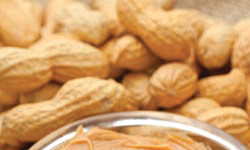
A new probe into suspected food fraud could be “much more serious” than the horse meat scandal, an expert has warned.
The Food Standards Agency investigation into cumin imports has led to the recall of two products containing undeclared almond traces, including an alert about a spice mix sold in Morrisons.
Professor Chris Elliott, who led the Government inquiry into the horse meat fraud that hit British supermarkets in 2013, insisted the seriousness of the issue should not be underestimated because the cases threatened the lives of nut allergy sufferers.
There have also been a number of cumin-based products recalled in the US and Canada for having undeclared peanut traces and Prof Elliott suggested it was due to a crop failure of the spice.
He said: “This is the first real test of the UK food supply system since the horse meat crisis.
“It’s actually much, much more serious because, in the whole horse meat scandal, nobody got ill and nobody died because of it.
“But if you happen to be allergic to almonds or peanuts, there is the potential of getting ill or even dying. So the challenge is there.
“This time, the crop failure is cumin and it does seem there has been fraud going on.”
A poor cumin harvest in the Gujarat region in India is being blamed for nuts being substituted for the spice, used widely in curries and soups.
The FSA began testing cumin imports to the UK after alerts in the US and Canada but said none of the products recalled there had been distributed in the UK.
The two British products recalled were Bart ground cumin from the Bart Ingredients Company Ltd and Morrisons Fajita Meal Kit.
The investigation into the potential food fraud is ongoing, but there is no suggestion the suppliers were aware of the issue.
Chief operating officer at the FSA Jason Feeney said: “We’ve been pro-active in checking for problems with cumin products in the UK and, as a precaution, are taking action to protect consumers.
“Currently, there is no evidence to suggest that the undeclared almond protein found in these products are linked to the problems with cumin found in the US and Canada.
“Investigations are ongoing. We continue to check for problems and will take action to protect consumers.”

Enjoy the convenience of having The Sunday Post delivered as a digital ePaper straight to your smartphone, tablet or computer.
Subscribe for only £5.49 a month and enjoy all the benefits of the printed paper as a digital replica.
Subscribe